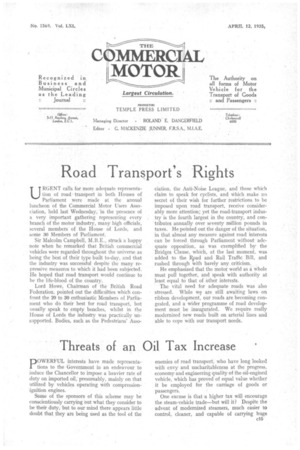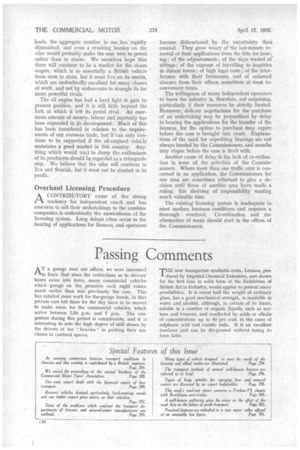Threats of an Oil Tax Increase
Page 37

Page 38

If you've noticed an error in this article please click here to report it so we can fix it.
POWERFUL interests have made representations to the Government in an endeavour to induce the Chancellor to impose a heavier rate of duty on imported oil, presumably, mainly on that utilized by vehicles operating with compressionignition engines.
Some of the sponsors of this scheme may be conscientiously carrying out what they consider to be their cluty, but to our mind there appears little doubt that they are being used as the tool of the enemies of road transport, who have long looked with envy and uncharitableness at the progress, economy and engineering quality of the oil-engined vehicle, which has proved of equal value whether it be employed for the carriage of goods or passengers.
One excuse is that a higher tax will encourage the steam-vehicle trade—but will it? Despite the advent of modernized steamers, much easier to control, cleaner, and capable of carrying huge loads, the aggregate number in use has rapidly diminished, and even a crushing burden on the oiler would probably make the user turn to petrol rather than to steam. We ourselves hope that there will continue to be a market for the steam wagon, which is so essentially a British vehicle from stem to stern, but it must live on its merits, which are undoubtedly excellent for many classes of work, and not by endeavours to strangle its far more powerful rivals.
The oil engine has had a hard fight to gain its present position, and it is still little beyond the fork at which it left its petrol rival. An enormous amount of money, labour and ingenuity has been expended in its development. Much of this has been considered in relation to the requirements of our overseas trade, but it can only continue to be supported if the oil-engined vehicle maintains a good market in this country. Anything which would tend to damp the .enthusiasm of its producers should be regarded as a retrograde step. We believe that the oiler will continue to live and flourish, but it must not be stunted in its youth.
Overhaul Licensing Procedure
ACONTRIBUTORY cause of the strong tendency -for independent coach and bus concerns to sell their undertakings to the combine companies is undoubtedly the unwieldiness of the licensing system. Long delays often occur in the hearing of applications for licences, and operators become disheartened by the uncertainty thus, created. They grow weary of the last-minute removal of their applications from the lists for hear-, ing; of the adjournments; of the days wasted at sittings; of the expense of travelling to inquiries in distant towns ; of high legal Costs; of the interference with their businesses, and of enforced absence from their offices, sometimes at most inconvenient times.
The willingness of many independent operators to leave the industry is, therefore, not surprising, particularly if their resources be strictly limited. Moreover, delicate negotiations for the purchase of an undertaking may be jeopardized by delay in hearing the applications for the transfer of the licences, for the option to purchase May expire before the case is brought into court. Explanations of the need for expediting hearings are not always heeded by the Commissioners, and months may elapse before the case is dealt with.
Another cause of delay is the lack of co-ordination in some of the activities of the Commissioners. Where more than one traffic area is concerned in an application, the Commissioners, for one area are sometimes reluctant to give a decision until those of another area have made a ruling, this shelving of responsibility wasting much valuable time.
The existing licensing system is inadequate to meet modern business conditions and requires a thorough overhaul. Co-ordination and the elimination of waste should start in the offices of the, Commissioners.












































































































